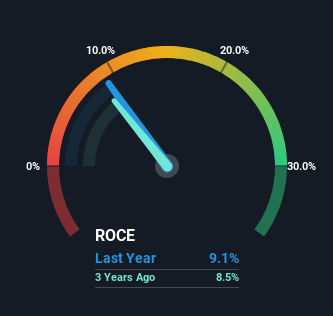Investors Met With Slowing Returns on Capital At Nexus (ETR:NXU)
Did you know there are some financial metrics that can provide clues of a potential multi-bagger? Amongst other things, we'll want to see two things; firstly, a growing return on capital employed (ROCE) and secondly, an expansion in the company's amount of capital employed. Put simply, these types of businesses are compounding machines, meaning they are continually reinvesting their earnings at ever-higher rates of return. Although, when we looked at Nexus (ETR:NXU), it didn't seem to tick all of these boxes.
What Is Return On Capital Employed (ROCE)?
If you haven't worked with ROCE before, it measures the 'return' (pre-tax profit) a company generates from capital employed in its business. The formula for this calculation on Nexus is:
Return on Capital Employed = Earnings Before Interest and Tax (EBIT) ÷ (Total Assets - Current Liabilities)
0.091 = €30m ÷ (€412m - €86m) (Based on the trailing twelve months to December 2023).
Thus, Nexus has an ROCE of 9.1%. Even though it's in line with the industry average of 9.1%, it's still a low return by itself.
View our latest analysis for Nexus
Above you can see how the current ROCE for Nexus compares to its prior returns on capital, but there's only so much you can tell from the past. If you'd like, you can check out the forecasts from the analysts covering Nexus for free.
How Are Returns Trending?
There are better returns on capital out there than what we're seeing at Nexus. The company has employed 123% more capital in the last five years, and the returns on that capital have remained stable at 9.1%. This poor ROCE doesn't inspire confidence right now, and with the increase in capital employed, it's evident that the business isn't deploying the funds into high return investments.
What We Can Learn From Nexus' ROCE
In conclusion, Nexus has been investing more capital into the business, but returns on that capital haven't increased. Investors must think there's better things to come because the stock has knocked it out of the park, delivering a 138% gain to shareholders who have held over the last five years. But if the trajectory of these underlying trends continue, we think the likelihood of it being a multi-bagger from here isn't high.
If you're still interested in Nexus it's worth checking out our FREE intrinsic value approximation for NXU to see if it's trading at an attractive price in other respects.
While Nexus isn't earning the highest return, check out this free list of companies that are earning high returns on equity with solid balance sheets.
Have feedback on this article? Concerned about the content? Get in touch with us directly. Alternatively, email editorial-team (at) simplywallst.com.
This article by Simply Wall St is general in nature. We provide commentary based on historical data and analyst forecasts only using an unbiased methodology and our articles are not intended to be financial advice. It does not constitute a recommendation to buy or sell any stock, and does not take account of your objectives, or your financial situation. We aim to bring you long-term focused analysis driven by fundamental data. Note that our analysis may not factor in the latest price-sensitive company announcements or qualitative material. Simply Wall St has no position in any stocks mentioned.

 Yahoo Finance
Yahoo Finance 
